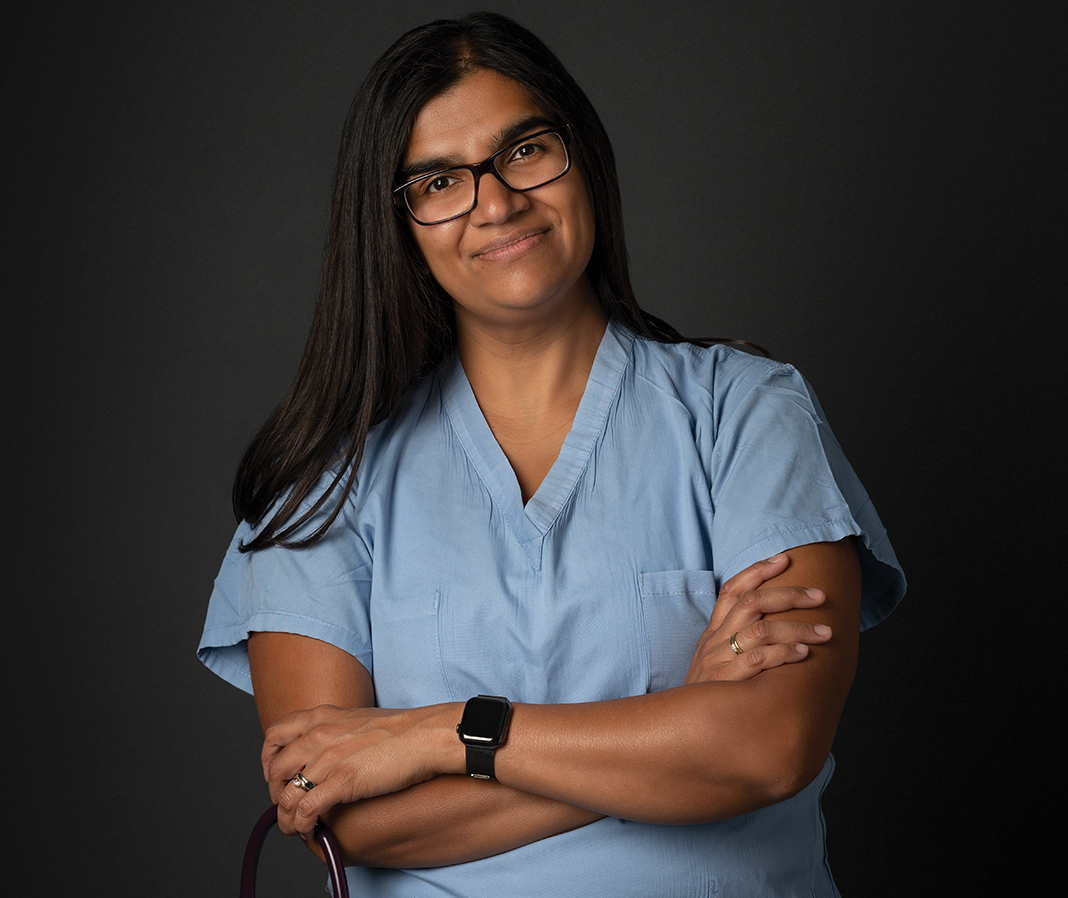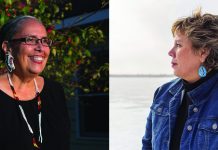
Photo by Bill Bartlett
Historically, women have been all but excluded from heart disease research. Dr. Retu Saxena and the Minneapolis Heart Institute at Abbott Northwestern Hospital seek to change that, working to “research her” (#ResearcHER). Boosted by a $5 million gift in 2019, the institute’s Penny Anderson Women’s Cardiovascular Center supports improvements in treatment for heart conditions that disproportionately affect women.
These areas include small vessel heart disease (chest pain without blocked arteries), spontaneous coronary artery dissection (a tear in a heart’s blood vessel), and takotsubo cardiomyopathy (broken heart syndrome).
A first-generation immigrant from India, Dr. Saxena comes from a family of physicians—including both of her parents, and her older sister. The 2020 Minnesota Monthly Top Doctor graduated from the University of Minnesota Medical School and trained at Oregon Health and Sciences University and the University of New Mexico.
Today, Saxena’s primary research focus is in cardio-pregnancy, and she says she shared findings with over 150 OB/GYN doctors in 2019.
“We know women are not small men— we have different pathophysiology, we respond differently to medicines—and yet we haven’t been enrolled in cardiovascular trials for the past 35 years,” she says. “It’s remarkable the number of women who still do not know that heart disease is the number one killer of women.”
How has treating heart disease been affected by COVID-19?
If you would have asked me when I finished training if I would be seeing patients from my home office, I would have laughed. While I have been doing more telemedicine, we are also busier with our ICU care. We are trying awfully hard to get patients in to be seen so we can take care of their hearts during this unprecedented time. We are doing everything we can to protect them from exposure to the virus while they are being seen. Everybody wears a mask, people are socially distant, and everything is sanitized several times. We do not want you to sit at home and suffer in silence with cardiac symptoms because you are worried about Covid, unfortunately many people did during the early part of the pandemic. Nationally, there is a big drive to encourage people to pay attention to their symptoms and be seen.
I have had my own patients who have heart disease say, “I had shortness of breath the other day, and I thought it was COVID.” I remind them that they also had a heart attack last year, and we should evaluate their symptoms further. Lo and behold, they have another blocked artery. Not all shortness of breath and chest pain is COVID-19. Heart disease is still the number one killer in the U.S.
 What health inequalities have you witnessed in your work?
What health inequalities have you witnessed in your work?
Women, in general, are under-evaluated and under-managed when it comes to heart disease and risk factors. If you happen to be a woman of color, you are more likely to suffer from heart failure and strokes. In my area of interest, which is cardio-pregnancy, the maternal mortality rates in this country for women of color, be it Black women or Native American women, are just woeful. Gestational complications are not often recognized or cared for well. Women are not told that what happens to them during pregnancy can impact their heart disease risk and stroke risk in one year, five years, or ten years down the line. If you happen to be a Black woman in this country, your chances of dying from heart disease, whether pregnant or not, is higher than any other population in this country. Our health care system needs to address these gaps, and do a better job in caring for these women.
How do you think we can solve these issues in the healthcare system?
One, having a provider who is more culturally literate. Two, trying to incorporate more medical literacy at a population level. Educating women about their cardiovascular risk and ensuring risk factors are aggressively treated. Three, meeting people where they are. We must treat everybody with compassion and care. We must listen to their stories and not write them off just because they look or sound a certain way.
What advice do you give to women who are trying to keep their hearts healthy?
I think the big one for women is learning to relax. So many women are stressed out and are worried day to day. They are not alone. Ninety percent of the women I see worry because they are caregivers. Women take care of jobs, families, and homes—women do everything. You know the one thing we women do not do a great job of taking care of? Ourselves.
The way women manifest stress, more often than not, impacts our blood pressure, our cardiac risk, and our cardiac risk factors. Women are more prone to broken heart syndrome than men are. Usually this is from an overwhelming stress response. Anything you can do to get out of your head and deal with your stress helps, be it meditation, dancing in your living room with your kids, singing to music, or exercising. Decreasing your stress and worry helps to lower inflammation and decrease cardiac risk.
Finally, you should get your cholesterol and blood pressure checked, have your doctor calculate a cardiovascular risk score, and seek treatment if any of these numbers are high. Don’t smoke—no vaping, no Juuls—stay away from nicotine in all forms. Try to maintain a healthy diet as well as eat more vegetables and fruits. Stay as far away from processed foods as possible. Try to get 30 minutes of exercise most days of the week and try to maintain a healthy weight.
 Why did you choose cardiology?
Why did you choose cardiology?
I went to medical school to become an OB/GYN, then I fell in love with infectious disease, but my first rotation as an intern was cardiology. At the time, my first attending was Dr. Jack McAnulty, who was well-known in the cardiology world. He is this sage, wise physician who would sit at the bedside, look patients in the eyes, and talk to people on their level. He mentored me.
I really enjoyed the physics of the heart, what’s called the physiology. And in my second year of residency, [McAnulty] let me put catheters in somebody’s heart. I was sold. Being able to help people, both from a prevention standpoint, or when they come in really sick is something I care a lot about. I make changes to help keep you alive and give you a good quality and quantity of life. I really appreciate all the facets of what I do on a daily basis.
Why did you choose to focus on women’s health?
Only about 11% of cardiologists across the country are women—so more women come to see me. I’ve heard stories of women having heart attacks and not being cared for in the emergency room. My mom died from heart disease—so I have a strong family risk. It’s hard to be a woman cardiologist and not get passionate about the discrepancies in care that are present without wanting to do something about it.
What career accomplishments are you most proud of, and what are you hoping to do in the future?
I spoke to over 150 OB/GYN physicians last year, educating them about cardio-pregnancy and gestational cardiovascular risk factors. It’s important to me to impart education for cardio-obstetrics, gestational cardiology, and how what happens to you during your pregnancy can impact you later in life. I’d like to get my research published this year and I am really excited to be a part of “The Warrior Study,” a multi-center trial which I am an investigator for through the Penny Anderson Women’s Center.
To learn more about the Penny Anderson Women’s Cardiovascular Center, click here.










